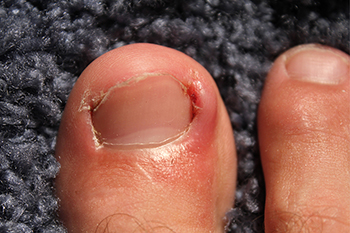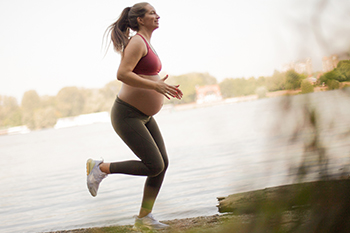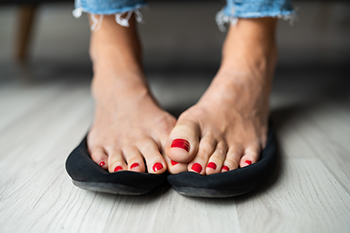1648 US Highway 130
North Brunswick, NJ 08902

Ingrown toenails can be a painful and persistent issue, usually affecting the big toe and causing discomfort, inflammation, and sometimes bleeding. An ingrown toenail often results from wearing tight shoes, foot injuries, genetics, or poor foot care. When the curved edges of the nail pierce into the surrounding skin, pressure builds up, leading to pain, inflammation, tenderness, and redness. Beyond conservative treatments, there are two primary surgical methods for treatment, which are referred to as partial nail avulsion and total nail avulsion. Both are conducted under local anesthesia. Partial nail avulsion involves removing a portion of the nail, known as a wedge resection. The procedure trims one or both edges of the nail to make it narrower and give it a straight edge. This ingrown toenail treatment takes approximately 30 minutes and has a high success rate. With total nail avulsion, the entire nail is removed. This procedure is often reserved for those with recurrent issues or who are unresponsive to other less invasive ingrown toenail treatments. Proactive toenail care and early intervention are key to addressing ingrown toenails effectively. To manage an exceedingly painful or infected ingrown toenail, it is suggested that you make an appointment with a podiatrist for an exam, in addition to determining if surgery is best for you.
Ingrown toenails can become painful if they are not treated properly. For more information about ingrown toenails, contact Dr. Robert Fink of Brunswick Foot & Ankle Group. Our doctor can provide the care you need to keep you pain-free and on your feet.
Ingrown Toenails
Ingrown toenails occur when a toenail grows sideways into the bed of the nail, causing pain, swelling, and possibly infection.
Causes
Prevention
Because ingrown toenails are not something found outside of shoe-wearing cultures, going barefoot as often as possible will decrease the likeliness of developing ingrown toenails. Wearing proper fitting shoes and using proper cutting techniques will also help decrease your risk of developing ingrown toenails.
Treatment
Ingrown toenails are a very treatable foot condition. In minor cases, soaking the affected area in salt or antibacterial soaps will not only help with the ingrown nail itself, but also help prevent any infections from occurring. In more severe cases, surgery is an option. In either case, speaking to your podiatrist about this condition will help you get a better understanding of specific treatment options that are right for you.
If you have any questions please feel free to contact our office located in North Brunswick, NJ . We offer the newest diagnostic and treatment technologies for all your foot and ankle needs.

Pregnancy is a transformative journey that brings about numerous changes in a woman's body. While most expectant mothers are well aware of the more obvious alterations, such as weight gain and a growing belly, the potential impact on foot size is a less commonly discussed topic. Many women wonder if their feet will permanently change in size during pregnancy. The answer, in most cases, is possibly. During pregnancy, hormonal changes, particularly the release of relaxin, can affect the ligaments in the body, including those in the feet. This increased flexibility may lead to a temporary, and sometimes permanent, increase in foot size. Additionally, as pregnancy progresses, fluid retention and swelling, known as edema, can cause the feet to become temporarily larger. While swelling typically subsides after childbirth, some women may find that their feet remain slightly larger than they were before pregnancy. Overall, it is important for expectant mothers to be prepared for these potential changes, and consider investing in comfortable, supportive footwear during and after pregnancy to ensure proper foot health and comfort. If you would like more information about how pregnancy can affect the feet, it is suggested that you confer with a podiatrist.
Pregnant women with swollen feet can be treated with a variety of different methods that are readily available. For more information about other cures for swollen feet during pregnancy, consult with Dr. Robert Fink from Brunswick Foot & Ankle Group. Our doctor will attend to all of your foot and ankle needs.
What Foot Problems Can Arise During Pregnancy?
One problem that can occur is overpronation, which occurs when the arch of the foot flattens and tends to roll inward. This can cause pain and discomfort in your heels while you’re walking or even just standing up, trying to support your baby.
Another problem is edema, or swelling in the extremities. This often affects the feet during pregnancy but tends to occur in the later stages.
How Can I Keep My Feet Healthy During Pregnancy?
If you have any questions please feel free to contact our office located in North Brunswick, NJ . We offer the newest diagnostic and treatment technologies for all your foot and ankle needs.

Baseball is a dynamic sport that requires players to engage in varied physical activities such as sprinting to bases, batting, throwing, and pitching. Players often experience rapid changes in movement, from running in straight sprints to shifting side to side while taking leads or fielding. Stability is vital, particularly in the lower body, to manage the force from these movements. The right foot is especially important due to its frequent contact with the base corners while running. Sliding injuries are common, with feet-first slides presenting a higher injury rate than head-first ones. Most injuries from sliding are minor, although some can sideline players for over a week. The introduction of breakaway bases has helped reduce such injuries. Pitchers need shoes with rigid soles for effective push-off, while catchers require flexibility in the forefoot due to their crouched position. All foot types, whether arched or flat, can adapt to the sport. Baseball injuries can vary, but a comprehensive approach to treatment includes a full history and physical exam, including an assessment of the player's shoes and gait. If you have endured a baseball foot injury, it is suggested that you make an appointment with a podiatrist for a proper diagnosis and treatment plan.
Sports related foot and ankle injuries require proper treatment before players can go back to their regular routines. For more information, contact Dr. Robert Fink of Brunswick Foot & Ankle Group. Our doctor can provide the care you need to keep you pain-free and on your feet.
Sports Related Foot and Ankle Injuries
Foot and ankle injuries are a common occurrence when it comes to athletes of any sport. While many athletes dismiss the initial aches and pains, the truth is that ignoring potential foot and ankle injuries can lead to serious problems. As athletes continue to place pressure and strain the area further, a mild injury can turn into something as serious as a rupture and may lead to a permanent disability. There are many factors that contribute to sports related foot and ankle injuries, which include failure to warm up properly, not providing support or wearing bad footwear. Common injuries and conditions athletes face, including:
Sports related injuries are commonly treated using the RICE method. This includes rest, applying ice to the injured area, compression and elevating the ankle. More serious sprains and injuries may require surgery, which could include arthroscopic and reconstructive surgery. Rehabilitation and therapy may also be required in order to get any recovering athlete to become fully functional again. Any unusual aches and pains an athlete sustains must be evaluated by a licensed, reputable medical professional.
If you have any questions please feel free to contact our office located in North Brunswick, NJ . We offer the newest diagnostic and treatment technologies for all your foot and ankle needs.

Excessive sweating, termed hyperhidrosis, occurs when individuals sweat profusely without apparent reasons such as heat or physical exertion. The two types of hyperhidrosis are focal hyperhidrosis, localized to specific body parts like the feet, and generalized hyperhidrosis, affecting the entire body due to potential medical issues. Regular sweating is the body's natural cooling mechanism during heat or exertion, whereas excessive sweating may be due to idiopathic hyperhidrosis, a hereditary condition with unknown causes. Certain medical conditions and medications can also be culprits. While not directly harmful, hyperhidrosis can impact an individual's emotional well-being and social interactions, and lead to conditions like eczema. Diagnosis involves an evaluation. Managing hyperhidrosis includes maintaining hygiene, wearing breathable fabrics, and drinking ample water. If your feet sweat excessively, it is suggested that you make an appointment to see a podiatrist who can evaluate your specific condition and offer appropriate treatment options.
If you are suffering from hyperhidrosis contact Dr. Robert Fink of Brunswick Foot & Ankle Group. Our doctor can provide the care you need to attend to all of your foot and ankle needs.
Hyperhidrosis of the Feet
Hyperhidrosis is a rare disorder that can cause people to have excessive sweating of their feet. This can usually occur all on its own without rigorous activity involved. People who suffer from hyperhidrosis may also experience sweaty palms.
Although it is said that sweating is a healthy process meant to cool down the body temperature and to maintain a proper internal temperature, hyperhidrosis may prove to be a huge hindrance on a person’s everyday life.
Plantar hyperhidrosis is considered to be the main form of hyperhidrosis. Secondary hyperhidrosis can refer to sweating that occurs in areas other than the feet or hands and armpits. Often this may be a sign of it being related to another medical condition such as menopause, hyperthyroidism and even Parkinson’s disease.
In order to alleviate this condition, it is important to see your doctor so that they may prescribe the necessary medications so that you can begin to live a normal life again. If this is left untreated, it is said that it will persist throughout an individual’s life.
A last resort approach would be surgery, but it is best to speak with your doctor to find out what may be the best treatment for you.
If you have any questions please feel free to contact our office located in North Brunswick, NJ . We offer the newest diagnostic and treatment technologies for all your foot and ankle needs.